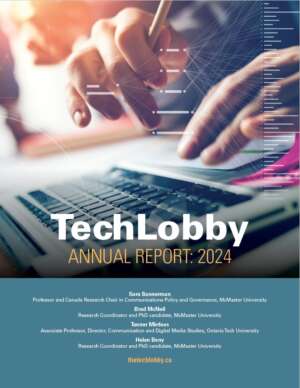
The TechLobby Annual Report for 2024 focuses on the federal lobbying of Google, Meta/Facebook, Netflix, Apple, Amazon, Disney, and Microsoft in 2024.
The interactive graphics for this report are available at the bottom of this page. You can click on the graphics and legends to explore and download the data.
Here are the report’s main findings:
- This report focuses on seven of the world’s top tech titans: Alphabet, Amazon, Apple, Disney, Meta, Netflix, and Microsoft. These seven companies are in the top 20 media and communications platforms by share of revenue in the Canadian market.
- The amount of tech lobbying in 2024 was fairly consistent with 2023, with Amazon and Google conducting the most lobbying. They were followed by Microsoft, Apple, Facebook, Netflix and Disney.
- Tech companies continued to rely more heavily on in-house lobbyists than is typical for most organizations. This could be due to the specialized expertise that in-house lobbyists can bring.
- A trend to a greater focus on the legislative branch of government over the executive branch likely reflects increased legislative activity relating to tech regulation.
- Numerous Canadian Members of Parliament (MPs) and Senators were lobbied by tech corporations in 2024; in fact, there was a 46% increase in lobbying of MPs compared to 2023, and there was a shift towards lobbying Conservative Members of Parliament over Liberals or other parties.
- There was a shift to use of generic labels to describe the subject matter of lobbying in 2024. Broadcasting, international trade, justice and law enforcement, and media were top lobbied subjects.
- We examine tech lobbying that took place on the following subjects:
- Bill C-11 (the Online Streaming Act);
- Bill C-18 (An Act Respecting Online Communications Platforms)
- Bill C-27 (Digital Charter Implementation Act)
- Bill C-63 (Online Harms Act)
- Bill C-26 (An Act respecting cyber security, amending the Telecommunications Act and making consequential amendments to other Acts)
- Bill S-210 (Protecting Young Persons from Exposure to Pornography Act)
- Bill C-72 (An Act respecting the interoperability of health information technology and to prohibit data blocking by health information technology vendors)
- Bill C-412 (An Act to enact the Protection of Minors in the Digital Age Act and to amend the Criminal Code)
- Government Procurement
- International relations and trade agreements affecting tech regulation, specifically the Canada-United State-Mexico Trade Agreement (CUSMA).
- Emerging AI policy such as the AI Compute Access Fund and copyright issues related to the Canadian AI Sovereign Compute Strategy.
- And broader topics, seemingly unconnected to specific legislation or policies, including copyright, taxation, and artificial intelligence.
- The Office of the Commissioner of Lobbying of Canada, has recently made changes to the way that lobbyists report their lobbying information and activities on the Registry of Lobbyists website to improve transparency. We discuss how these changes have improved transparency in Canadian lobbying reporting.
Tech lobbying should properly be viewed in the context of the lobbying of traditional media companies and broader coalitions of advocacy organizations and companies. While this report focuses on the lobbying of ‘tech companies,’ it is important to note that traditional media and communications companies lobbied extensively in many of the same areas that tech companies did, as did advocacy groups and coalitions and associations representing groups of companies. We intend to focus, in future annual reports, on the relative lobbying between these groups of companies as well as the lobbying of other organizations in the same areas.
